Clifford Garstang's Blog, page 54
January 25, 2015
The New Yorker: “Box Sets” by Roddy Doyle
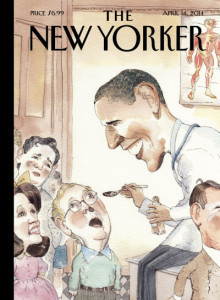 April 14, 2014: “Box Sets” by Roddy Doyle
April 14, 2014: “Box Sets” by Roddy Doyle
After three months of unemployment, Sam is feeling the strain. He and his wife goes to the homes of friends for dinner parties at which the menu features ethnic “street food” and the conversations revolves around “box sets” from mostly American television series. Sam, partly because of his job situation, I suppose, feels behind the times, as he has not seen these programs. One day he and Emer argue. He doesn’t want to go to yet another dinner, feeling the stress of unemployment, although he doesn’t quite admit it. Angry, he takes the dog for a walk when he is slammed into by a cyclist. The cyclist is hurt, although Sam in his anger thinks only of himself. He even manages to get home, without a thought for the dog. In the end, he has concluded that everything will be fine.
The story lacks depth, I think. Although the metaphor of the box sets is interesting, it isn’t really utilized fully, or at all, and the main story of Sam’s stress and epiphany is pretty shallow.
January 24, 2015
2015 Reading: Subtropics Issue 17, Winter/Spring 2014
 Subtropics is the journal of the University of Florida edited by David Leavitt and Sidney Wade. I’ve been a subscriber off and on since the magazine debuted in 2006. I’ve just read Issue 17 Winter/Spring 2014. (The image at left is Teen in Body Paint by Roger Sacha and graces the cover of the issue, although there it is partially obscured by a list of contributors.)
Subtropics is the journal of the University of Florida edited by David Leavitt and Sidney Wade. I’ve been a subscriber off and on since the magazine debuted in 2006. I’ve just read Issue 17 Winter/Spring 2014. (The image at left is Teen in Body Paint by Roger Sacha and graces the cover of the issue, although there it is partially obscured by a list of contributors.)
There is just one nonfiction piece in the issue, so let me start with that: “Authorship in Contemporary American Literature” by Anis Shivani. Shivani came to the attention of a lot of writers through some controversial columns he wrote for The Huffington Post. This essay is in that vein, but I think it will appeal mostly to “literary critics” who actually care about the Foucault, Derrida, Barthes, deconstruction, the New Criticism, and all that has flowed since. Academics might. I don’t think writers do.
He begins with Barthes’s essay “The Death of the Author.” The idea, as I understand it, is that the author disappears as soon as the work is written. Fair enough. In a workshop, I would argue that the work must stand on its own. (And yet, there is context to consider, and why should the reader ignore it?) Apparently, not much has changed in the last 50 years..
Near the end of the essay, Shivani takes a stab at a conclusion: “Aside from rebellious authors like Rushdie, who don’t seem to have gotten the memo, authors have disappeared from culture–they have in fact died, except that they themselves seem not to have noticed that they have died.” I don’t know about anyone else, but I’m still here.
As for the poetry, there’s a lot. I noticed that several friends/Facebook friends have poems here, including Lesley Harrison, John Poch, and Sandra Marchetti.
The fiction includes several translations. One that I liked particularly is Margarita Khemlin’s “Shady Business,” translated from Russian by Lisa Hayden. In the story, Bella Levina returns to Kiev from Israel after many years and then disappears. Her family comes to look for her and by visiting the Jewish Cemetery in their ancestral village learn what happened during the war.
I also liked Aaron Hamburger’s “Honeymoon for One,” a story about a recently married gay man who is obsessed with pandas and so, when his husband can’t travel with him, goes on his own to the preserve in China where he can interact with the animals. He also interacts, amusingly, with his tour guide, Fanny.
And I was enjoying China Miéville’s “Säcken” until it turned into a horror story. Joanna, a historian, takes her lover Mel (a woman) to a remote cabin in Germany where she intends to finish some essays. Mel is spooked by something–something in the lake, a cockerel on the shore–and insists on leaving. After she returns to London, Joanna disappears. Mel and Joanna’s family return to investigate . . .
These were the highlights for me, but there’s a lot more.
January 20, 2015
The New Yorker: “Inventions” by Isaac Bashevis Singer
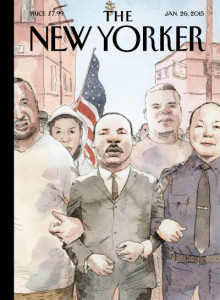 January 26, 2015: “Inventions” by Isaac Bashevis Singer
January 26, 2015: “Inventions” by Isaac Bashevis Singer
According to This Week in Fiction: Isaac Bashevis Singer this story was published in Yiddish in 1965 but the translation was only recently discovered. Definitely read this q&a with the researcher who found the story in Singer’s papers.
The story itself raises more questions than it answers. It seems to be experimental, in which metaphorical dreams and ghosts figure prominently, in sort of a meta way.
The first person narrator has moved to the country and goes to bed early. He wakes up at two with ideas. On the night in question, he wakes with a plan “to write about a Communist . . . who attends a leftist conference on world peace and sees a ghost.” The plan then takes over the story, which is now about this Communist, Morris Krakower. Krakower goes to sleep in his hotel but he awakened when he feels the blanket being tugged from the bed. But there’s no one there so he believes he imagined it. The experience repeats, though, and eventually (after a passage where the narrator returns to consider his own dreams) he sees the ghost of Comrade Damschak who had disappeared some years earlier).
Without the help of the q&a, the meaning of the story would elude me, but clues are there, including a guess as to why the story wasn’t published in the US during Singer’s lifetime.
2015 Reading: Waking Up by Sam Harris
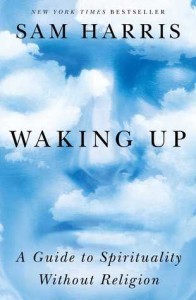 Waking Up: A Guide to Spirituality Without Religion by Sam Harris
Waking Up: A Guide to Spirituality Without Religion by Sam Harris
Recently, I had a brief online exchange with a former student who questioned by use of the word “spiritual” outside of a religious context. Certainly, many people do refer to religious experiences when they use the term, but increasingly the term has come to mean other forms of inward exploration, including efforts to seek an understanding of one’s position in the universe–relationships with the environment and with others.
Sam Harris is using the term in a slightly different, but related way, I think. By “spirituality” he seems to mean “self transcendence,” which I think is perhaps both more internal than my use of the term and also larger, because it seems to place a greater emphasis on a unified consciousness.
In any event, I enjoyed listening to Harris’s narration of his book, and agreed with him on most points. The basic idea, I think, is that one doesn’t need religion in order to explore and enlarge the mind. Through various techniques, including meditation and/or mind-altering drugs, enlightenment is attainable. His lengthy discussion of psychedelic drugs is interesting, although not terribly helpful for most people. But his tips for meditation are sound.
New Issue of Prime Number Magazine: No. 67
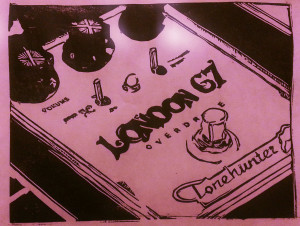 We have just published Issue 67 of Prime Number Magazine. Check it out! Fiction by Nick Ostdick and Michael Overa, Nonfiction by James Alan Gill and Kathleen Blackburn, Poetry by Mimi Herman, Judith Pulman, Steven D. Schroeder, and M.E. Silverman, Reviews of books by Elise Juska, Okla Elliott, and Dominique Manotti, and a fascinating interview with Sergio Troncoso.
We have just published Issue 67 of Prime Number Magazine. Check it out! Fiction by Nick Ostdick and Michael Overa, Nonfiction by James Alan Gill and Kathleen Blackburn, Poetry by Mimi Herman, Judith Pulman, Steven D. Schroeder, and M.E. Silverman, Reviews of books by Elise Juska, Okla Elliott, and Dominique Manotti, and a fascinating interview with Sergio Troncoso.
Also, read about the process artist Lindsay Curren used to create our cover image for this issue, shown here.
We’re open for submissions year round, so take a look at our submission guidelines and send us something. Better yet, consider entering our annual contest (deadline March 31) for a chance to win $1000 and publication.
January 19, 2015
Prime Number Magazine Awards — 2015
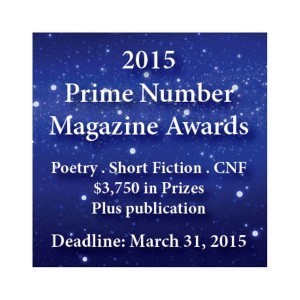 Prime Number Magazine, of which I am the editor, is now accepting entries for the 2nd Annual Prime Number Magazine Awards. We have made a few changes this year, and we’re very excited to be offering much larger prizes than we did last year.
Prime Number Magazine, of which I am the editor, is now accepting entries for the 2nd Annual Prime Number Magazine Awards. We have made a few changes this year, and we’re very excited to be offering much larger prizes than we did last year.
We have three categories: Short Fiction, Creative Nonfiction, and Poetry. First prize in each category is $1000 plus publication; Second prize is $250 plus publication; and Third prize is publication.
Read the full guidelines here: Prime Number Magazine Awards. Only submissions through Submittable will be accepted. The deadline is March 31, 2015.
We’ve got a great lineup of judges: Fiction (Rebecca Makkai); Creative Nonfiction (Sarah Einstein); and Poetry (Alan Michael Parker). Read about them here.
Please send us your excellent work!
2015 Reading: The Gettysburg Review, Autumn 2010
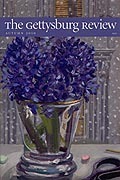 The Gettysburg Review, Autumn 2010
The Gettysburg Review, Autumn 2010
I’ve been a subscriber to TGR for a long time, so when I grabbed a copy to read this week it turned out to be an older one, from 2010. It’s a terrific publication, but obviously I haven’t done a good job of keeping up! Shame on me.
I didn’t love everything in this issue, but there were some terrific stories, essays, and poems.
I was surprised to see a poem by Billy Collins, and I liked “Gold” very much, which opens “I don’t want to make too much of this,” and repeats that idea in various ways. A nice, humble poem.
The essay that follows it, “Final Concert” by Eve Becker, I also enjoyed. Although it’s sad—her father was a concert violist and the essay ends with his death—it’s also hopeful.
“Brief Lives,” a short story by Paul Zimmer, is a somewhat humorous take on old age. The main character, Cyril, lives in a nursing home and likes to sneak out to visit the nearby tavern where he drinks beer and spews what he has remembered (or made up) about the lives of others. Because of the course the story takes it reminds me a bit of Flannery O’Connor’s “A Good Man is Hard to Find.” That’s a compliment.
At first I didn’t care for “The Box” by Maryanne Wilimek, which begins at quite a distance from its subject (it appears to be telling the author’s husband’s story). But when the author recounts her research into the contents of a box of photo albums, it gets interesting. She spends a couple of days trying to track down on the Internet the clues she finds—names on the back of a picture, a letter, etc. Interesting stuff.
There’s a full color insert of paintings by Barbara Kassel. Fantastic. Be sure to click on her name to visit her website to see more of her work.
I’m also going to mention the essay “A Little Short of Perfect” by Lee Haas Norris mostly because of a coincidence. I was in a coffee shop reading this piece about Norris and her husband who, having finished their Peace Corps service in Moldova, are working as volunteers on an archeological dig in neighboring Romania. Any mention of the Peace Corps intrigues me, as I served as volunteer myself (South Korea, 1976-77). After reading the essay, which deals with a medical problem suffered by the author’s husband, I finished reading the journal and moved on to a book I’d brought with me. But then I couldn’t help but overhear a conversation a young woman was having with someone at the table next to mine. It seems that she had been accepted to the Peace Corps and would be heading to Moldova in June! I interrupted the conversation and showed the Moldova-bound volunteer the essay.
January 18, 2015
The New Yorker: “Pending Vegan” by Jonathan Lethem
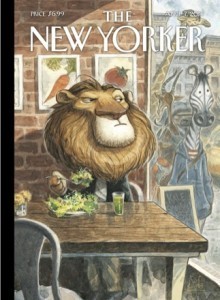 April 7, 2014: “Pending Vegan” by Jonathan Lethem
April 7, 2014: “Pending Vegan” by Jonathan Lethem
Paul, weaning himself from an anti-depressant, takes his family to SeaWorld. His daughter, Deirdre, is afraid of everything. On the way to the orca show, the main event, they see flamingos and the shark exhibit. But Paul is worried about what he might see, because his [politically incorrect] psychiatrist has warned him that the drug might have some lingering effects: “In withdrawal from Celexa some patients have described a kind of atmosphere of rot or corruption or peril creeping around the edges of the everyday world, a thing no one but they can identify.” This is the “grub-in-meat syndrome,” and Paul is wary. He’s wary because of his secret name for himself—Pending Vegan.
Paul has been reading about sustainability and the evils of factory farming. He now believes it’s wrong to eat animals, but it’s difficult to explain to his twin girls. While looking at the sharks, the girls ask if they can get a pet. (A shark brings this to mind?) Which causes Paul to flashback to the Jack Russell terrier he and his wife had had before the girls were born, a dog that had been so possessive of his pregnant wife that Paul had to take him back to the shelter. The dog, named Maurice, isn’t mentioned until half way through the story, but as we’ll see he is what brings the story to a somewhat satisfying end. Because Bingo, a Jack Russell terrier who is part of the pre-Orca show entertainment, turns out to be Maurice, all these years later.
The Q&A with Jonathan Lethem suggests that Lethem is thinking about the situation of starting down a path—such as becoming a vegan, but there are other themes in the story, too, like being a husband and father—and then getting stuck.
There are some great concepts and ideas in this story, but I’m not sure they’re working well together. Paul’s pending veganism is a great thought. So many of us, I think, having read the books Paul has read, realize that veganism is the way to go, but just can’t take the necessary steps to get there. Also, being stuck—and Paul is stuck deep—is connected to the anti-depressants he’s been taking and from which he’s beginning to emerge. But that part of the story is less clear to me. Is SeaWorld in a different light because of the drug? And how does this relate to the dog who is reunited with the family in the end? Not sure.
January 17, 2015
Digging Deep: A Fiction Workshop
 Beginning Tuesday, January 20, I’m teaching an 8-week fiction workshop at WriterHouse in Charlottesville that I call Digging Deep.
Beginning Tuesday, January 20, I’m teaching an 8-week fiction workshop at WriterHouse in Charlottesville that I call Digging Deep.
My thinking is that writers–if they’re like me–tend to be lazy. They probably realize that a first draft isn’t good enough, but they aren’t willing to do the really hard work, the digging, when it comes to revision. That first sentence? Is it really doing all the work that it could be doing? That second sentence? Do you really need that dangling modifier? Is that the word you really want there? Does your setting add to the plot or theme? What do these characters do for the story?
We’re going to read some classic stories, starting with “A Good Man is Hard to Find,” which is outstanding on so many levels, and we’ll move on to contemporary stories from Best American Short Stories 2014. Plus, it’s a workshop, so we’ll take out our magnifying glasses to examine student work.
Should be fun.
January 16, 2015
Bridgewater International Poetry Festival — happening now!
 Poetry fan? Head on over to Bridgewater College in Bridgewater, Virginia (about a half hour north of Staunton, VA, where I live) where the Bridgewater international Poetry Festival is happening right now!
Poetry fan? Head on over to Bridgewater College in Bridgewater, Virginia (about a half hour north of Staunton, VA, where I live) where the Bridgewater international Poetry Festival is happening right now!
The festival, which is the brainchild of poet Stan Galloway, happens every other year and features dozens of poets from all over the world. It’s a four-day event, with simultaneous readings happening each day (which means, you can’t hear everyone, even if you wanted to).
I attended on opening day because I had some friends reading and because I also wanted to hear Stephen Corey, Editor of the Georgia Review, and Pamela Uschuk, Editor of Cutthroat and also one of the family of Editors at Press 53. They were both terrific and I was able to get a copy of Pam’s new book, Blood Flower, and some free copies of the Georgia Review (with a new subscription). And besides hearing my friends Mai-linh Hong and Jeff Schwaner read their wonderful work, I also heard a few other visiting poets.
Many more of my friends are reading over the next few days, and regrettably I wont be able to get there to hear them. Check out the schedule!



